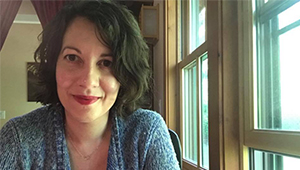Creating meaning in health care
Video produced by Melissa Parson
Research by Marlaine Figueroa Gray, PhD, includes exploring the intersection of medicine and creativity
Marlaine Figueroa Gray, PhD, assistant investigator at Kaiser Permanente Washington Health Research Institute (KPWHRI), studies how to provide more patient- and family-centered care, especially when that kind of care can have the most impact. She recently answered questions about her research, including a project to study creative programs in hospitals.
Your research in patient experience and patient-centered care is rooted in your background in medical anthropology. Tell us about that field.
Medical anthropology is a subfield of cultural anthropology that focuses attention on the intersection of health and culture, illness, and medical practices. It examines how social and structural factors influence lived experiences of illness and how we provide and receive health care.
We use a variety of qualitative methods such as interviews, focus groups, and participant observations to elicit narratives about medicine and health. These are the methods I use in my work at KPWHRI. Examples of 2 KPWHRI projects that I've found especially meaningful are understanding what types of care are available to people who are living with dementia but don't have close family caregivers and studying how to best support young adults who have their lives disrupted by cancer.
My current research focuses on what matters most to people during times of medical uncertainty, such as if they have received a serious diagnosis or are nearing the end of life, and how they think about their legacy when making choices about medical treatment. This work is supported by a National Cancer Institute diversity supplement that I recently received. It's a career development award to support diversity in scientific research, and I'm using it to lay a foundation for my future work as an end-of-life researcher.
My work strives to help patients, friends, family members, and medical professionals make sense of, and live with, serious illness, mortality, and grief. We need this information to make meaningful improvements to medical care so that the care people receive is in line with their values and identities.
How might your research be useful for patients, medical professionals, and health care leaders?
Biomedicine, also known as Western medicine, is the dominant model of medical care in the U.S. Our medical culture values positivism — the idea that we can know things for certain — and efficiency. Yet patients are often complex, with multiple illnesses and ailments that are not easily diagnosed, or not fully understood, or not easily treated. I am interested in doing research that explores what good care looks like amidst this uncertainty.
For example, my PhD research at the University of Washington explored interactive art programs, which are increasingly common in hospitals. I sought to understand the perspectives of artists, patients, hospital administrators, and clinicians regarding the intersection of creativity and biomedicine.
Creative expression often celebrates uncertainty — what will happen when we approach a blank page? Where will we be after this music session, or after creating poetry during illness? I explored how creative expressive activities can complement biomedical care and possibly have economic benefits by reducing the need for sedation and repeat complex diagnostic procedures. I showed how embracing uncertainty can disrupt the positivist logic of medical care, and offer new, varied alternative models of caring for patients as social beings. Creative programs elicit values that lead to a better clinical experience for all — the patient, their loved ones, and the professionals who provide their care.
I hope my research stimulates discussions among health care leaders, artists, and patient groups about how to accompany patients through illnesses that have uncertain pathways, and also promotes understanding of how interactive art programs could promote patient- and family-centered care.
How does your past work influence your current research?
A theme in my current research is how to understand and honor the patient as a social being and provide medical care that affirms a patient's personhood and values.
My current work is about analyzing the construction of a legacy and examining how legacy impacts treatment choices. An example is a collaboration with KPWHRI Associate Investigator Karen Wernli on how young adults with advanced cancer make treatment decisions in the last 6 months of life. I'm also collaborating with KPWHRI Affiliate Investigator Janelle Taylor on providing for people with dementia who don't have close relatives to manage their care. My diversity supplement work is with Associate Investigator Nora Henrikson on a trial to provide navigation support to people with cancer who have financial hardships.
This work seeks to improve medical care now but also to build a conceptual foundation of legacy. From this foundation, we as researchers can explore ways to guide patients, their families, and their medical providers in thinking about how to improve care so it maintains a person's values and social identity throughout the many stages of the illness experience.
More on Marlaine Figueroa Gray’s research has recently been published in a new book, Creating Care: Art and Medicine in US Hospitals.
News

KPWHRI appoints Dr. Marlaine Figueroa Gray assistant investigator
A medical anthropologist, she brings extensive experience in using qualitative research methods to elicit illness narratives.
Healthy findings blog

What does ‘patient-centered, family-centered care’ mean?
Drs. Clarissa Hsu and Marlaine Figueroa Gray asked patients, caregivers, and physicians this question.


